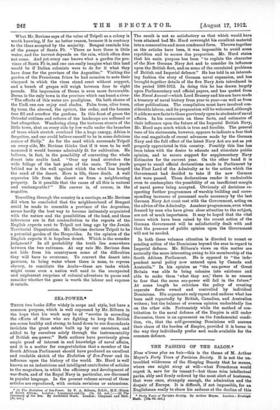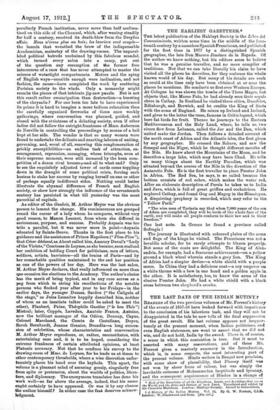THE PASSING OF THE SALON.*
Nous n'irons plus au bois—this is the theme of M. Arthur Meyer's Forty Years of Parisian Society. It is not the un- troubled wilderness of the Sleeping Beauty that he means, where one might stray, at will—what Frenchman would regret it, save for its tenant ?—but those trim intellectual parks, ably and firmly ordered by the most alert of hostesses, that were once, strangely enough, the admiration and the despair of Europe. It is difficult, if not impossible, for an Englishman really to share his sadness at the decline of this • Forty Years of Parisian Society. By Arthur Meyer. London : Eveleigh Hash. lOs. 65. net.]
peculiarly French institution, never more than half acclima- tized on this side of the Channel, which, after waning steadily for half a century, received its death-blow from the Dreyfus affair. Nous n'irons plus an boil; les lauriers sent coupds- the laurels that wreathed the brow of the indispensable Academician, mainstay of the drawing-rooms. The unparal- leled political hatreds unchained by this fabulous scandal, which turned every salon into a camp, put out of the question any resumption of *he former free intercourse of a race that has never attempted to master the science of watertight compartments. Motors and the aping of English ways—sensible enough were inclination, and not fashion, the cause—have completed the work by scattering Parisian society to the winds. Only a monarchy might reunite the pieces of that intricate jig-saw puzzle. But is not this result rather emancipation than destruction—a bursting of the chrysalis P For one born too late to have experienced its prime it is hard to imagine a more tedious relaxation than the carefully organized fireworks of these once weekly gatherings, where conversation was planned, guided, and closed with the strictness of a debating society, even if other ladies did not follow the outright frankness of Mme. Aubernon de Nerville in controlling the proceedings by means of a bell kept at her side. The wonder is that so many women were found to undertake the delicate and exacting labours of uniting, governing, and, worst of all, renewing this conglomeration of prickly susceptibilities—an endless task of attraction, en- couragement, repression, assuaging, whose triumphs, even at their supreme moment, were still menaced by the keen com- petition of a dozen rival houses andall to what end ? Only to see the exquisitely adjusted tower of cards come toppling down in the draught of some political crisis, forcing each hostess to stake her success by ranging herself on one or other of perhaps equally indifferent sides. Nothing could better illustrate the abysmal difference of French and English society, or show how strongly the influence of the seventeenth century has persisted in what till yesterday was the most parochial of capitals.
As editor of the Gaulois, M. Arthur Meyer was the obvious person to lament the change. His reminiscences are grouped round the career of a lady whom he compares, without very good reason, to Manon Lescaut, from whom she differed in seriousness, purpose, and success. Probably Aspasia was too trite a parallel, but it was never more in point—Aspasia educated by Sainte-Beuve. Thanks in the first place to his guidance and the assistance of Prince Napoleon ("Plea-Plon"), that Cisar deelassi, as About called him, Amaury Duval's "Lady of the Violets," Comtesse de Loynes, as she became, soon realized her ambition of holding Court for politicians, men of letters, soldiers, artists, barristers—all the brains of Paris—and by her remarkable qualities maintained to the end her position as one of the powers of her day. Hers was the last salon, M. Arthur Meyer declares, that really influenced on more than lane occasion the elections to the Academy. The author's choice has the merit of being typical, and in any case serves as a peg from which to string his recollections of the notable persons who flocked year after year to her Fridays—in the earlier days, the younger Dumas, Sardou (" the Caligula of the stage," as Jules Lemaitre happily described him, neither of whom as an insatiate talker could be asked to meet the other), Flaubert, Paine, Theophile Gautier (" is bon Theo") Mistral; later, Coppee, Lavedan, Anatole France, Antoine, now the brilliant manager of the Odeon, Donnay, Capus, Colonel Marchand, the Comte de Castellane, Doyen, Sarah Bernhardt, Jeanne Granier, Brandies—a long succes- sion of celebrities, whose characteristics and conversation M. Arthur Meyer reproduces, or, rather, reconstitutes, with entertaining ease and, it is to be hoped, considering the extreme frankness of certain attributed opinions, at least Platonic accuracy. Not that he confines his survey to the drawing-room of Mme. de Loynes, for he leads us at times to other contemporary thresholds, where a wise discretion unfor- tunately places his hand over the keyhole. This apart, the volume is a pleasant salad of amusing gossip, singularly free
from spite or pretension, about the worlds of politics, litera- ture, and diplomacy. The anonymous translator has done his work well—so far above the average, indeed, that his name ought certainly to have appeared. Or was it by any chance the author himself ? In either case the feat deserves acknow- ledgment.







































 Previous page
Previous page